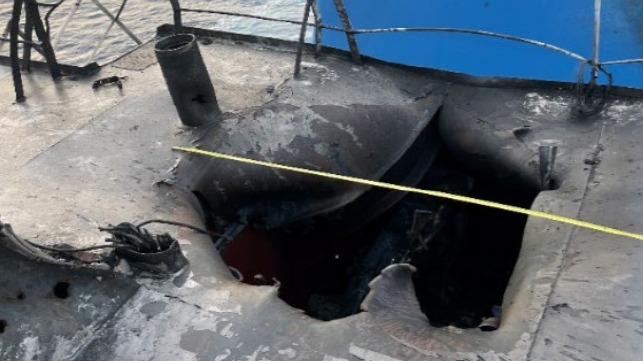Photo: US Central Command
Iran’s drone attack against the Israeli-operated MT Mercer Street offshore of Oman was its most significant escalation at sea since 2019. The attack on July 29, which killed two crew members, displayed Iran’s dangerous tendency to launch drone strikes and assault ships that are peacefully and legally transiting through international waters, particularly vessels with connections to Israel.
Adding to the list of Iran’s complete disregard for customary international law and the United Nations Convention on the Law of the Sea (UNCLOS), Iranian gunmen allegedly hijacked a Panama-flagged tanker, the MV Asphalt Princess, in the Gulf of Oman on August 3. Apparently, because of the ingenuity of the crew and incompetence of the alleged Iranian hijackers, the ship was “released” the following day.
With Tehran’s aggression growing at an alarming pace, the United States and its partners need a strong, persistent, and cohesive response that deters and degrades Iran’s ability to launch these deadly attacks.
According to US Central Command, Iran launched two unsuccessful drone attacks on the Mercer Street before a third explosive drone killed the Romanian captain and a British crew member. Since ships are in constant motion — striking them, let alone striking a subsection of the vessel like the bridge, as happened in this case — requires a significant degree of accuracy. Iran’s ability to specifically target the bridge may show an increase in Iranian intelligence, surveillance, and precision capabilities. By launching multiple waves of kamikaze drones, Iran signaled that it wanted to kill those on board, not merely harass them or damage the ship’s hull, as it has previously done.
Clashes between Israel and Iran escalated in April, with Iran attacking Israeli cargo ships, and Israel retaliating against Iranian military vessels. Israel has primarily targeted illicit oil sales, and there have been dozens of Israeli attacks on Iranian ships headed for Syria in furtherance of these sales and weapons proliferation in recent years.
Tehran apparently believes that the critical waterways near its coasts are the best locations to retaliate against Israel’s military operations that seek to roll back Iranian influence in Syria and Lebanon, often called the “Campaign Between the Wars.” Iran’s attack on the Mercer Street indicates that Israel’s efforts have not deterred Iran from firing at innocent shipping vessels.
Considering that new Iranian president Ebrahim Raissi took office shortly after the recent incidents and the stalled negotiations in Vienna over Iran’s nuclear program, Tehran is likely testing the resolve of the new Israeli government, the United States, the United Kingdom, and regional Arab partners.
Iran has designed, manufactured, and proliferated drones to proxy groups, including the Houthis in Yemen, Hamas in Gaza, and Shia militias in Iraq, who are increasingly using drones to strike US service members, partners, and interests this year. Now, the attack on the Israeli vessel shows that Iran is willing and able to apply the operational and tactical lessons it has learned about drones to its maritime aggression campaign.
The continued absence of significant consequences for Tehran’s aggression will reinforce the idea that the international community lacks the will to challenge it.
When Iran did not face significant consequences for assaulting commercial ships in mid-2019, it escalated its aggression that September by attacking critical Saudi energy facilities at Abqaiq and Khurais. The region faces the prospects of a similar attack if the current one is left unchecked.
In preparation for further aggression, the US Department of Defense should conduct more military training exercises with Israel and Arab partners that focus on Iranian naval and drone activity.
Building upon the Abraham Accords, Washington should push for Israel’s participation in the International Maritime Security Construct, which has escorted ships in the Arabian Gulf since 2019. The group currently includes the United States, the United Kingdom, Saudi Arabia, the United Arab Emirates, Bahrain, Albania, Estonia, and Lithuania, but could benefit from Israel’s intelligence and naval capabilities.
However, this is likely not enough alone to deter the Iranians. Instead, Washington needs to develop a comprehensive approach that includes a more consistent and potent use of military force. The United States, the United Kingdom, and Israel should pursue a coordinated military response to Iran’s naval aggression. At the same time, the Biden administration should make clear that Israel can respond independently of any joint action.
Over the longer term, Washington should lead an effort to form a regional, multilayered air defense and early warning network to enable faster identification and response against Iranian attacks. In tandem, America should collaborate with regional partners, including Israel, to upgrade existing defense systems and develop new systems. The US Army is currently assessing its recently acquired Iron Dome batteries, a system that has a naval variant that the Pentagon should explore purchasing.
America and its partners must push back on Iran’s naval and drone aggression. Accomplishing this goal requires a steadfast and comprehensive approach. Failure to do so may invite even greater aggression from Tehran.
Retired Vice Adm. John W. Miller served as commander of the US Navy’s 5th Fleet. He was a participant in the Jewish Institute for National Security of America’s (JINSA) 2018 Generals and Admirals Program.
Originally published in The Algemeiner

